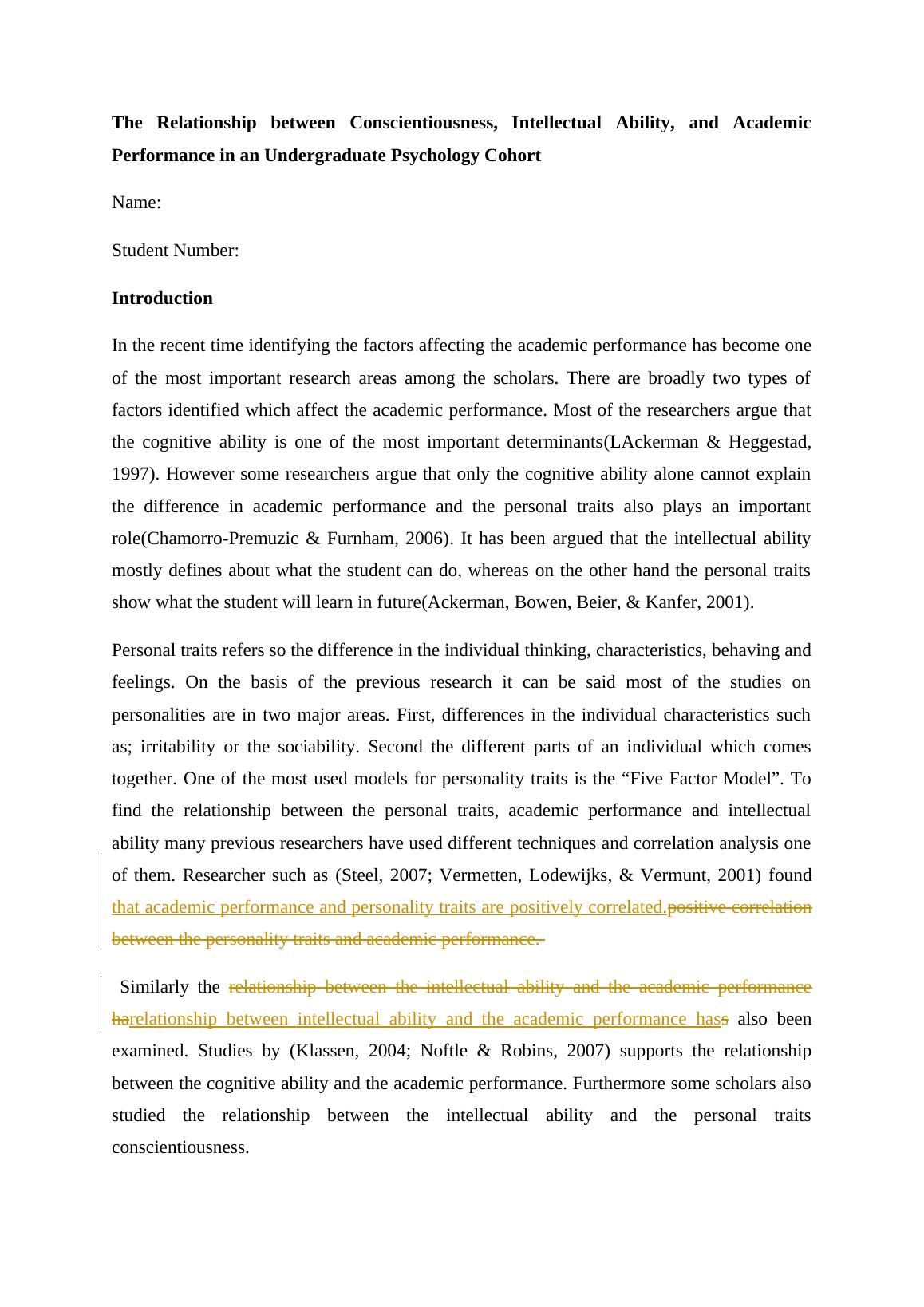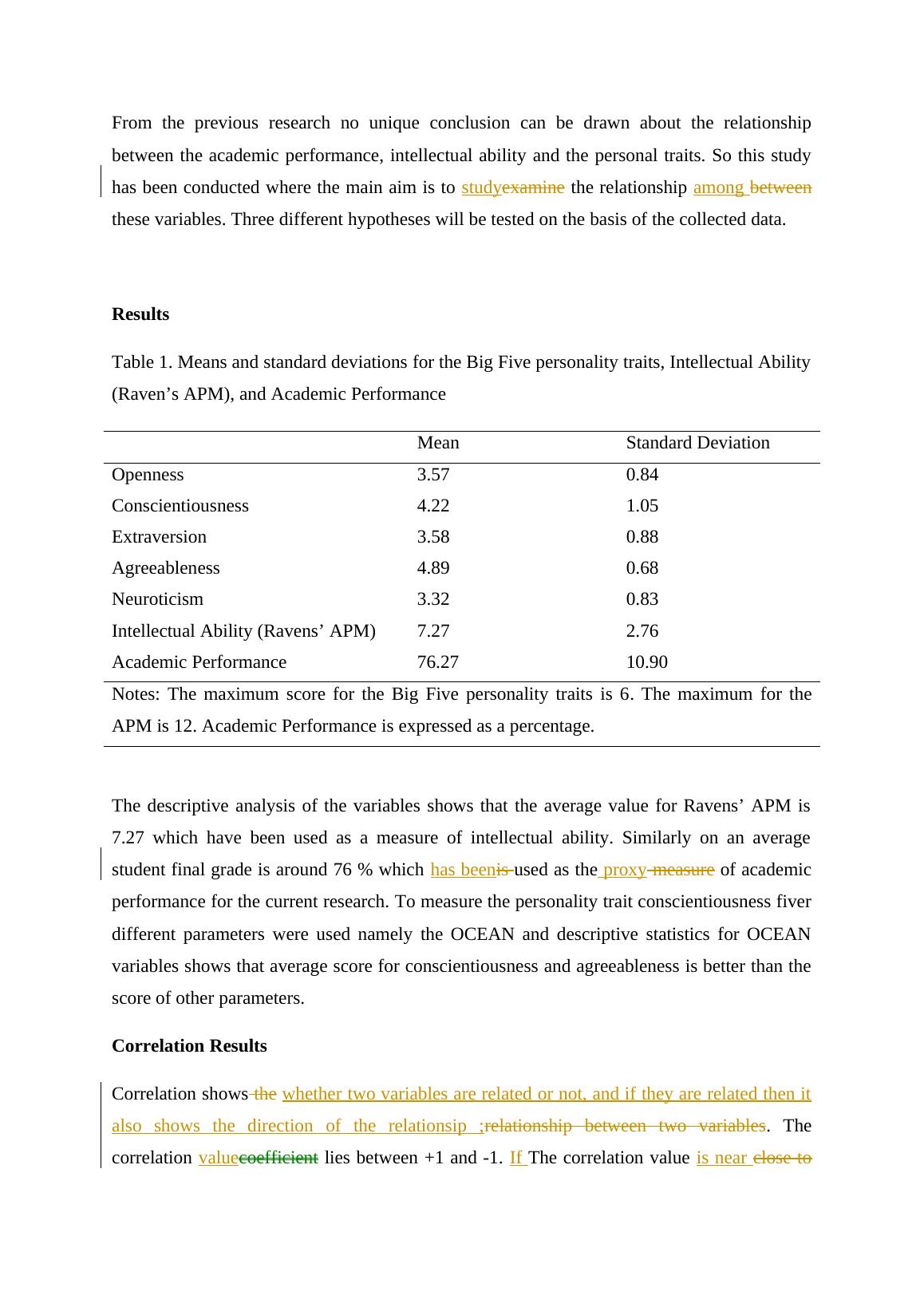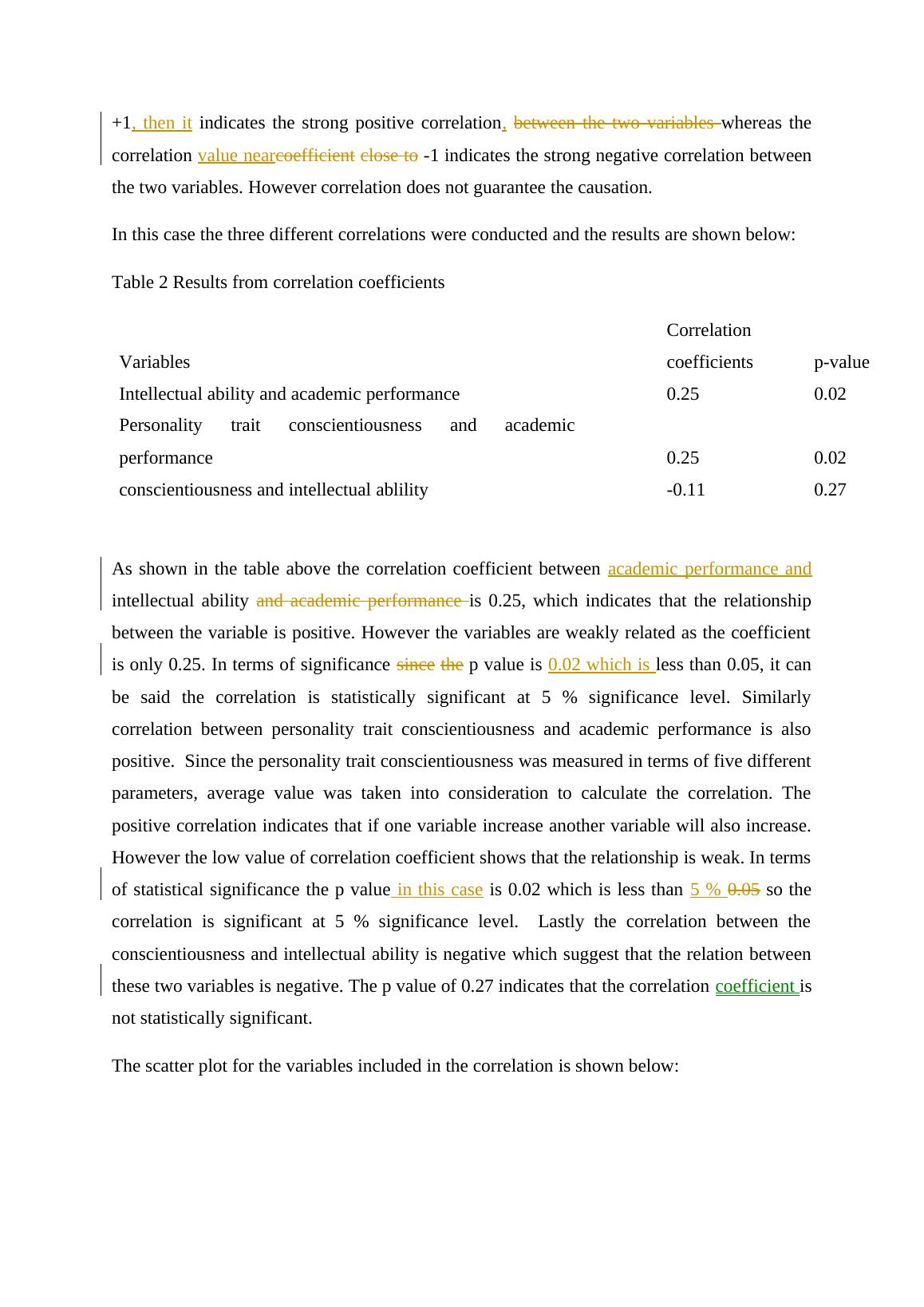Ask a question from expert
Conscientiousness and Intellectual Ability Relationship Paper
7 Pages1815 Words230 Views
Added on 2020-04-07
Conscientiousness and Intellectual Ability Relationship Paper
Added on 2020-04-07
BookmarkShareRelated Documents
The Relationship between Conscientiousness, Intellectual Ability, and AcademicPerformance in an Undergraduate Psychology CohortName:Student Number:IntroductionIn the recent time identifying the factors affecting the academic performance has become oneof the most important research areas among the scholars. There are broadly two types offactors identified which affect the academic performance. Most of the researchers argue thatthe cognitive ability is one of the most important determinants(LAckerman & Heggestad,1997). However some researchers argue that only the cognitive ability alone cannot explainthe difference in academic performance and the personal traits also plays an importantrole(Chamorro-Premuzic & Furnham, 2006). It has been argued that the intellectual abilitymostly defines about what the student can do, whereas on the other hand the personal traitsshow what the student will learn in future(Ackerman, Bowen, Beier, & Kanfer, 2001). Personal traits refers so the difference in the individual thinking, characteristics, behaving andfeelings. On the basis of the previous research it can be said most of the studies onpersonalities are in two major areas. First, differences in the individual characteristics suchas; irritability or the sociability. Second the different parts of an individual which comestogether. One of the most used models for personality traits is the “Five Factor Model”. Tofind the relationship between the personal traits, academic performance and intellectualability many previous researchers have used different techniques and correlation analysis oneof them. Researcher such as (Steel, 2007; Vermetten, Lodewijks, & Vermunt, 2001) foundthat academic performance and personality traits are positivelycorrelated.positive correlationbetween the personality traits and academic performance. Similarly the relationship between the intellectual ability and the academic performanceharelationship between intellectual ability and the academic performance hass also beenexamined. Studies by (Klassen, 2004; Noftle & Robins, 2007) supports the relationshipbetween the cognitive ability and the academic performance. Furthermore some scholars alsostudied the relationship between the intellectual ability and the personal traitsconscientiousness.

From the previous research no unique conclusion can be drawn about the relationshipbetween the academic performance, intellectual ability and the personal traits. So this studyhas been conducted where the main aim is to studyexamine the relationship among betweenthese variables. Three different hypotheses will be tested on the basis of the collected data.ResultsTable 1. Means and standard deviations for the Big Five personality traits, Intellectual Ability(Raven’s APM), and Academic PerformanceMeanStandard DeviationOpenness3.570.84Conscientiousness4.22 1.05Extraversion3.580.88Agreeableness4.890.68Neuroticism3.320.83Intellectual Ability (Ravens’ APM)7.272.76Academic Performance76.27 10.90Notes: The maximum score for the Big Five personality traits is 6. The maximum for theAPM is 12. Academic Performance is expressed as a percentage.The descriptive analysis of the variables shows that the average value for Ravens’ APM is7.27 which have been used as a measure of intellectual ability. Similarly on an averagestudent final grade is around 76 % which has beenis used as the proxy measure of academicperformance for the current research. To measure the personality trait conscientiousness fiverdifferent parameters were used namely the OCEAN and descriptive statistics for OCEANvariables shows that average score for conscientiousness and agreeableness is better than thescore of other parameters.Correlation ResultsCorrelation shows thewhether two variables are related or not, and if they are related then italso shows the direction of the relationsip ;relationship between two variables. Thecorrelation valuecoefficient lies between +1 and -1. If The correlation value is near close to+1, then it indicates the strong positive correlation,between the two variables whereas thecorrelation value nearcoefficientclose to -1 indicates the strong negative correlation betweenthe two variables. However correlation does not guarantee the causation.

In this case the three different correlations were conducted and the results are shown below:Table 2 Results from correlation coefficientsVariables Correlationcoefficients p-valueIntellectual ability and academic performance 0.250.02Personality trait conscientiousness and academicperformance 0.250.02conscientiousness and intellectual ablility -0.110.27As shown in the table above the correlation coefficient between academic performance andintellectual ability and academic performance is 0.25, which indicates that the relationshipbetween the variable is positive. However the variables are weakly related as the coefficientis only 0.25. In terms of significance sincethe p value is 0.02 which is less than 0.05, it canbe said the correlation is statistically significant at 5 % significance level. Similarlycorrelation between personality trait conscientiousness and academic performance is alsopositive. Since the personality trait conscientiousness was measured in terms of five differentparameters, average value was taken into consideration to calculate the correlation. Thepositive correlation indicates that if one variable increase another variable will also increase.However the low value of correlation coefficient shows that the relationship is weak. In termsof statistical significance the p value in this case is 0.02 which is less than 5 % 0.05 so thecorrelation is significant at 5 % significance level. Lastly the correlation between theconscientiousness and intellectual ability is negative which suggest that the relation betweenthese two variables is negative. The p value of 0.27 indicates that the correlation coefficient isnot statistically significant.The scatter plot for the variables included in the correlation is shown below:

End of preview
Want to access all the pages? Upload your documents or become a member.
Related Documents
Factors Affecting Affective University Satisfactionlg...
|15
|3055
|29
Report | Aspects in Human Resource Managementlg...
|49
|14684
|31
Individual Difference in Personality - Case Study Reportlg...
|8
|1784
|415
Assignment on Strategies for Learning in Educationlg...
|8
|1939
|18
Big Five personality traits : Assignmentlg...
|8
|1993
|157
Positive Effects of Ageing and Age Diversity in Innovative Companieslg...
|7
|2033
|381